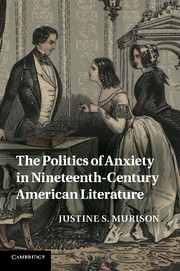Book contents
- Frontmatter
- Contents
- Acknowledgments
- Introduction
- 1 A bond-slave to the mind: sympathy and hypochondria in Robert Montgomery Bird's Sheppard Lee
- 2 Frogs, dogs, and mobs: reflex and democracy in Edgar Allan Poe's satires
- 3 Invasions of privacy: clairvoyance and utopian failure in antebellum romance
- 4 “All that is enthusiastic”: revival and reform in Harriet Beecher Stowe's Dred
- 5 Cui bono?: spiritualism and empiricism from the Civil War to American Nervousness
- Epilogue: the confidences of anxiety
- Notes
- Index
- CAMBRIDGE STUDIES IN AMERICAN LITERATURE AND CULTURE
1 - A bond-slave to the mind: sympathy and hypochondria in Robert Montgomery Bird's Sheppard Lee
Published online by Cambridge University Press: 01 June 2011
- Frontmatter
- Contents
- Acknowledgments
- Introduction
- 1 A bond-slave to the mind: sympathy and hypochondria in Robert Montgomery Bird's Sheppard Lee
- 2 Frogs, dogs, and mobs: reflex and democracy in Edgar Allan Poe's satires
- 3 Invasions of privacy: clairvoyance and utopian failure in antebellum romance
- 4 “All that is enthusiastic”: revival and reform in Harriet Beecher Stowe's Dred
- 5 Cui bono?: spiritualism and empiricism from the Civil War to American Nervousness
- Epilogue: the confidences of anxiety
- Notes
- Index
- CAMBRIDGE STUDIES IN AMERICAN LITERATURE AND CULTURE
Summary
If I were seriously to propose to Congress to make mankind into sausages, I have no doubt that most of the members would smile at my proposition, and if any believed me to be in earnest, they would think that I proposed something much worse than Congress had ever done.
Henry David Thoreau, “Slavery in Massachusetts” (1854)One can easily imagine that Edgar Allan Poe experienced a jolt of recognition as he sat down to read Robert Montgomery Bird's Sheppard Lee; Written by Himself (1836). Published anonymously by Harper and Brothers, Sheppard Lee is a novel of metempsychosis in which Lee's spirit inhabits and reanimates a succession of corpses, including a gouty brewer, a dandy on the make for a rich wife, and a Virginia slave hanged for insurrection. Not only playing on Poe's favorite terrain of unmoored souls, Bird turns this potentially gothic conceit into comedy. As it turns out (and much to Poe's displeasure), the metempsychosis in Sheppard Lee is all a dream. Poe's review of the novel for the Southern Literary Messenger judges Bird's handling of the transmigration of souls to be both a literary and medical problem. “The chief source of interest in such narrative,” chides Poe, “is, or should be, the contrasting of these varied events […] upon a character unchanging – except as changed by the events.” Rather, Lee “partially loses, and partially does not lose, his identity, at each transmigration,” robbing the narrative as a whole of consistency.
- Type
- Chapter
- Information
- Publisher: Cambridge University PressPrint publication year: 2011



